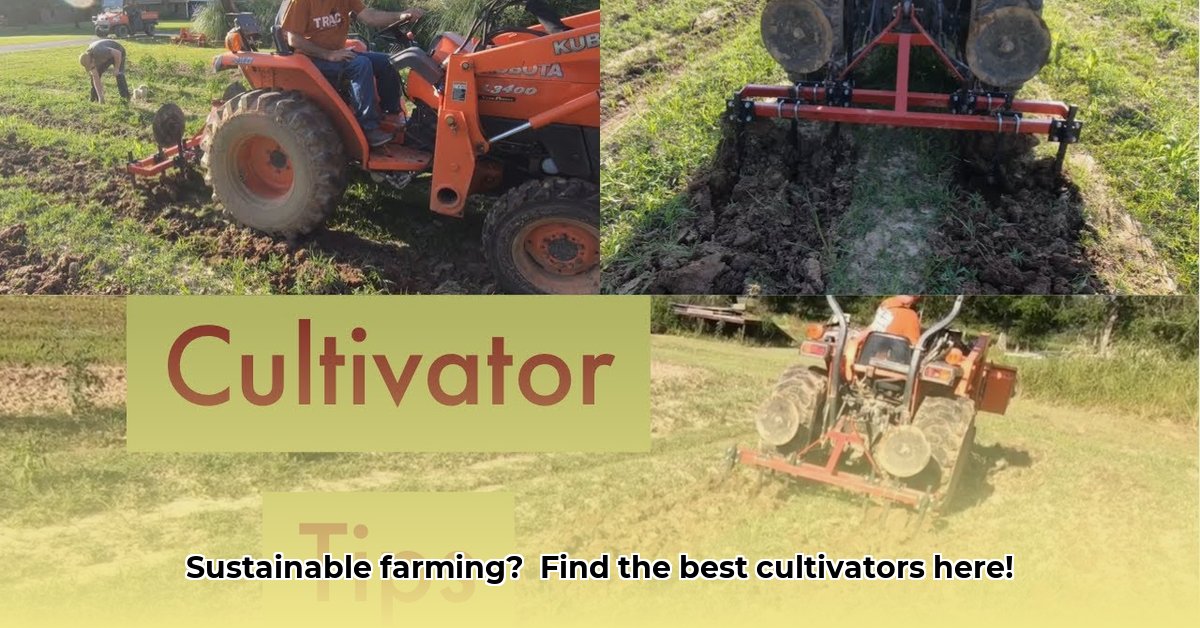
Choosing the right cultivator can significantly impact the sustainability and efficiency of your farming operation. This guide helps you navigate the options available at Tractor Supply, focusing on models that promote environmentally friendly practices while delivering optimal performance. For more on sustainable farming practices, check out this helpful resource on manure management.
Understanding Your Options: Cultivator Types at Tractor Supply
Tractor Supply offers a range of cultivators suitable for various farm sizes and soil conditions. Selecting the right tool depends heavily on your specific needs and agricultural goals. Let's examine the most common types:
Rotary Tillers
Rotary tillers are versatile machines ideal for seedbed preparation, mixing compost, and breaking up soil clods. Their effectiveness makes them suitable for smaller plots, home gardens, and smaller-scale farms. However, they can be fuel-intensive and may compact soil if not used carefully. Are rotary tillers the right fit for your budget and farm size?
Disc Harrows
For larger fields and heavy soils, disc harrows provide efficient soil mixing. They're often more fuel-efficient than rotary tillers, which is a key benefit for sustainable farming. However, they may compact soil more heavily than some alternatives. Consider the trade-off between fuel efficiency and potential soil compaction when choosing a disc harrow.
Field Cultivators
Field cultivators are best suited for maintaining existing fields rather than initial soil preparation. They excel at weeding and aerating soil, minimizing soil disturbance, and thus promoting soil health. This makes them a strong choice for sustainable agriculture. While fuel-efficient, they may require multiple passes to achieve the desired results. Is minimizing soil disturbance a priority in your farming operation?
Choosing the Right Cultivator: A Step-by-Step Guide
Selecting the best cultivator requires careful consideration of several key factors. Follow these steps for a well-informed decision:
Step 1: Assess Your Farm and Soil:
Begin by evaluating the size of your land and the type of soil. Heavy clay soils will benefit from the robust mixing action of a disc harrow, while lighter soils may be better suited to a rotary tiller. This initial assessment will narrow down your options considerably. How will your soil type influence your cultivator choice?
Step 2: Define Your Budget:
Cultivators at Tractor Supply range in price. Establishing a budget beforehand will prevent impulse purchases and ensure you stay within your financial constraints. Remember, prioritizing sustainable practices doesn't always mean sacrificing affordability.
Step 3: Consider Your Crops:
Different crops have different soil preparation needs. Some, like certain vegetables, thrive with minimal soil disruption; others require more thorough tilling. Align your cultivator choice with the specific requirements of your crops. What are the specific soil preparation needs of the crops you plan to cultivate?
Step 4: Prioritize Sustainability:
Focus on cultivators known for fuel efficiency and minimal soil disturbance. Reduced tillage methods not only contribute to environmental sustainability but also lead to healthier soil in the long run. Reduced soil disturbance maintains better soil structure, which improves water retention, reduces erosion, and encourages soil biodiversity. How does reduced tillage contribute to sustainable farming practices?
Maintaining Your Cultivator For Optimal Performance
Regular maintenance is crucial for extending the life and effectiveness of your cultivator. These simple steps will keep your equipment running smoothly:
Regular Lubrication: Keep moving parts well-lubricated according to the manufacturer's instructions. This minimizes wear and tear, extending the lifespan of your equipment.
Blade Sharpening: Dull blades reduce efficiency and can damage the cultivator. Regular sharpening ensures optimal performance.
Proper Storage: Protect your cultivator from the elements during periods of non-use to prevent corrosion and damage.
Cultivating a Sustainable Future: Final Thoughts
Choosing the right cultivator is an investment in the long-term health of your land and the environmental sustainability of your farming practices. By carefully considering the factors outlined in this guide, you'll be well-equipped to select a cultivator from Tractor Supply that aligns with your operational needs and promotes a balanced approach to sustainable farming. Remember that ongoing research continues to improve our understanding of optimal tillage methods, so staying informed and adapting your practices as new information becomes available is a key component of sustainable agriculture.